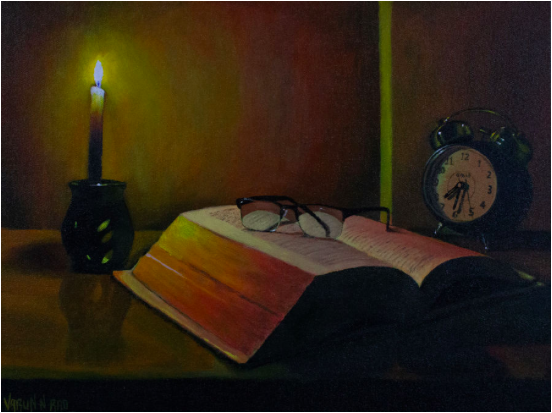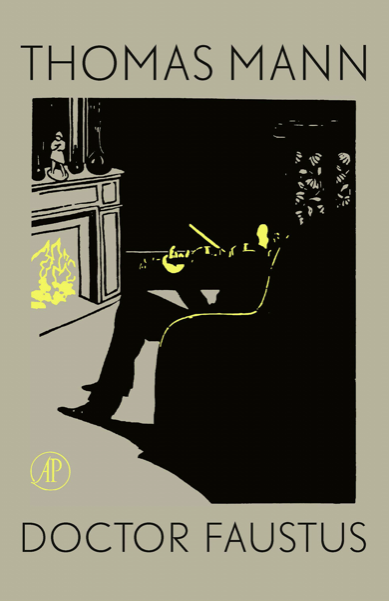Reading

"Zoals het avondklokje thuis tikt, tikt het nergens..."
Gevleugelde woorden van mijn grootvader tijdens de Tweede Wereldoorlog toen de zogenaamde "spertijd" gold. Oude tijden herleven.
Huisarrest leidt tot bezinning. Tot nadenken over de zin en de goede dingen van het leven. Het zal dus geen verwondering wekken dat boeken en het lezen ervan zich mogen verheugen in hernieuwde belangstelling. Dit gegeven spoorde mij, in het licht van de aankomende corona-avondklok, aan tot het volgende initiatief:
Het oprichten van de online leesclub voor musici
"De Avondklok".
 Graag nodig ik liefhebbers uit voor een wekelijks uitwissel-uurtje rondom de roman Doctor Faustus van Thomas Mann (1875-1955). En wel hoofdstuk 1 tot en met 3 (voor de eerste keer).
Graag nodig ik liefhebbers uit voor een wekelijks uitwissel-uurtje rondom de roman Doctor Faustus van Thomas Mann (1875-1955). En wel hoofdstuk 1 tot en met 3 (voor de eerste keer).
Positioneer je webcam op zodanige wijze dat je, gezeten in je leesstoel bij je boekenkast(en) zichtbaar bent, genietend van een boek, onder milde verlichting nippend aan een goed glas wijn.
Eerste "bijeenkomst":
Zaterdag 23 januari 2021 om 21.00 uur. Daarna wekelijks op dezelfde tijd.
https://join.skype.com/lyN06VUOIeE4
De link om aan deze Skype bijeenkomst deel te nemen zal op deze pagina verschijnen, en tevens op geëigende andere kanalen zoals de FB pagina('s) van het PCC.
In the year 2018-2019 I would like to start an experiment with ARRANGEMENTS, aiming at specific groups of students, designed as READING arrangements or STUDY arrangements.
Why?
Contextual Studies has a (deliberate) generalistic approach, the student groups are heterogenous, and the content of the program is rather diverse. Considering the goals we have with Contextual Studies this formula is just fine. To compensate for the generalistic part, students have a lot of freedom in the research topics they can choose for the writing of their contextual essays.
Nevertheless:
During the last years, I regularly felt the urge to offer something "more specific" for homogenous groups of students. In my conversations with students I was asked from time to time if "something special" for their instrument could be realized. To give some examples:
- organists asked for the possibility of counterpoint lessons exceeding the level of existing general lessons in harmony (HML 2 and 3)
- singers would like to dive into art song and song cycles
- string players would like to dive into great string quartets
- students who didn't feel challenged at all by the regular program would love to set their teeth in something complex and, for a change, dive deep into a topic.
Electives: a step in the right direction
The introduction of electives has in my opinion certainly been a good step in this direction, but even electives are still for the greater part supply-oriented instead of demand-oriented, although there is the possibility to propose personal elective-projects.
I believe that we (as a school) honestly try to make the best decisions about what has to be learned, and also try our best to take wishes of students into account. That is: if those wishes are compliant with the standards we have to measure up to as an institution of higher education(!).
Having said this, everybody should realize that the size of our relatively small school makes the realization of our wishes difficult, or sometimes even impossible...
But: We should never give up :-).
So I started to think of a possible way to address this issue.
WIN-WIN: ELECTIVES FOR FOCUS GROUPS?
Maybe it's an idea to opt for an elective designed as arrangement for a group (what I would call a focus-group):
I think it's a simple and at the same time elegant way to create a win-win situation: make electives more demand-oriented, and at the same time realize wishes of students that are difficult to realize within the present curriculum.
What kind of groups for example?
Based on the major
- string players
- brass instrument players
- organists / harpsichordists
- pianists
- woodwind players
- singers
- percussionists
- harpists / guitar players
- ...
Of course other homogenous groups are possible: people who love books and reading can be in my opinion also a focus-group!
Let's add that one:
- Book lovers :-D
Let me start with giving just three titles for each category I named.
The links lead you to information about the book on www.amazon.com or wikipedia.
It's also a good idea to take a look on www.goodreads.com .




